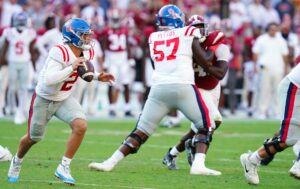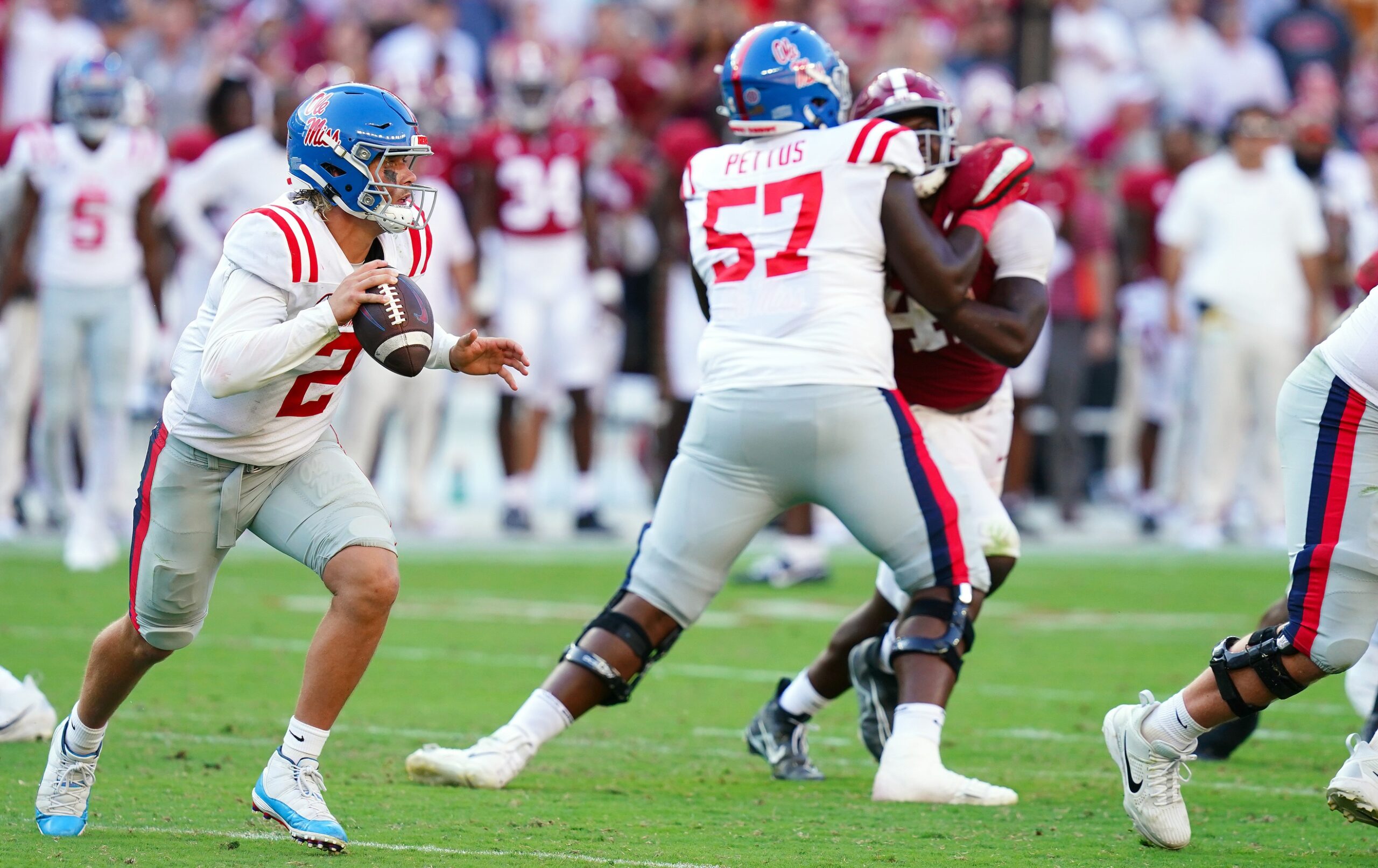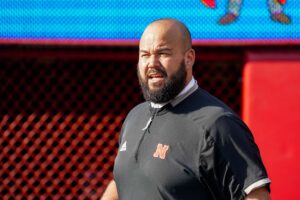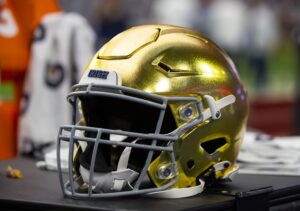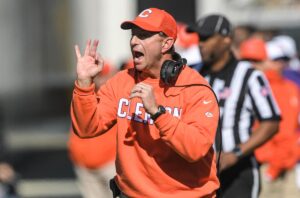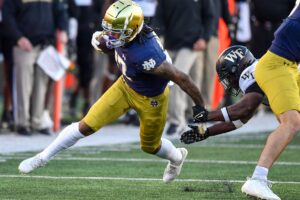Ole Miss lost to Alabama on Saturday. And while that’s unfortunate enough for Rebel fans, it may not be the worst part of the game. The worst part is the way they lost. In the 24-10 defeat at the hands of the Crimson Tide, Ole Miss’ issues were put on full display for everyone to see.
Now, that’s not to say there weren’t bright spots, especially in the first half. There certainly were. And those were primarily on the defensive side of the ball. Despite giving up a few too many yards, the defense played extremely well for much of the game. But as the game went on, those bright spots (even on defense) became huge, gaping problems that you don’t want to see if you view yourself as a legitimate contender.
As they’ve now reached conference play, if Ole Miss wants to have long-term success this season, they’ve got to fix these problems.
Ole Miss’ Issues Start With the Offensive Line
There was cautious optimism that the offensive line would be a solid part of the team this season. As of right now, that was an incorrect assumption. Through four games, the offensive line struggles have been one of the glaring holes on the team.
What makes this worse is the fact that the Rebels returned four of their five starting linemen from last season. With an experienced unit, you would like to think these issues wouldn’t arise. But that hasn’t been the case. If the offensive line play doesn’t get better, it’s going to be a long season for Ole Miss.
Playing in the SEC, the ability to control the line of scrimmage is of vital importance. As a team, if that isn’t managed, you’re likely to struggle. This is exactly where the Rebels find themselves through four games. However, the offensive line certainly isn’t the only issue that got exposed on Saturday. But it does serve as a good transition into the next problem.
The Rushing Woes Continue
This is perhaps the most surprising of any of the problems we’ve seen from the Rebels so far this season. The Rebels rushing attack has been nonexistent. As has been previously covered, Ole Miss led the SEC in rushing last season. They also had the conference’s leading rusher in Quinshon Judkins.
So far this season, that’s not even remotely the case. They currently rank 10th in the SEC in rushing. Judkins himself only has 201 yards on the ground, averaging 3.5 yards per carry. Last season, he averaged 5.7 yards per carry. If the Rebels want to have legitimate success this season, getting Judkins going is a must.
The struggles in the rushing game come from multiple different angles. Part of the problem is very clearly the offensive line. Their leading rusher on the year is currently quarterback Jaxson Dart. For a few programs out there, the quarterback being the leading rusher wouldn’t be a big deal. For Ole Miss, it signifies a problem.
But the other side of the rushing equation is that the running backs haven’t seemed completely engaged, either. Last year saw Judkins running through plenty of tackles. This year, not so much. It’s easy to point the blame solely at the offensive line. But the backs themselves have to step up and run more physically. Until these two things happen, the rushing woes are likely to continue.
Injuries
The injuries, while out of their control, are another problem. There hasn’t been a game this season where the Rebels have had everyone available, for one reason or another. And it’s primarily been throughout the wide receiver room.
The injury bug first hit right before the opener against Mercer, when it was announced that Zakhari Franklin was going to be out. Then, for Week 2 vs. Tulane, Franklin and fellow wide receiver Tre Harris were out. Their third game, a matchup against Georgia Tech, saw Franklin and Harris out once again. Then, on Saturday in Tuscaloosa, magic seemed to happen. Franklin and Harris were both listed as available, and both saw snaps, albeit in limited capacity.
But there was one Rebel that was expected to make an impact this season that ended up missing the Alabama game. Tight end Michael Trigg wasn’t available, though it doesn’t appear to be injury-related. It’s worth pointing out that Trigg is no longer listed on the Ole Miss roster, so he isn’t even on the team any longer.
As Franklin and Harris become more healthy, and eventually reach 100%, the hope would be that the injury question is finally put to rest. Becoming a healthier team could also be something that has an impact on the last problem we’re going to address surrounding Ole Miss moving forward and that is…
Ole Miss’ Play Calling Is Atrocious
There’s no way around it. The play calling from the Rebels has been bad. Following the opening blowout win over Mercer, things have gone downhill surrounding the plays. And while it had been noticeable over the past two weeks, it became abundantly apparent on Saturday.
In blunt terms, it honestly looks like the Ole Miss coaching staff refuses to move the ball upfield. Virtually every play has ended up being a run, or else it’s a pass that goes sideline to sideline, instead of downfield. Both of those have been staples of a Lane Kiffin offense in the past, but it’s gone over the top this season. Especially when you consider the fact that they haven’t been able to run the ball successfully.
The offensive line struggles could be a partial cause for this, but eventually, you have to take chances anyway. Currently, it looks like the Rebels coaching staff doesn’t agree with that assessment. Whether it’s Kiffin himself, or offensive coordinator Charlie Weiss Jr. calling the plays, something has to change. Based on Kiffin’s comments this week, it sounds like it’s primarily Weiss doing the play calling.
Whoever it is, the conservative approach isn’t working. It’s time to open the playbook up, and get the ball downfield, instead of sideline to sideline. Until this changes, expect the offense to continue to be in a bit of a rut.
The Bottom Line
Ole Miss is a talented football team that should find itself in the top half of the SEC standings by season’s end. But given what was put on display Saturday against Alabama, they’re a long way away from making that a reality. There are numerous things that need to change, and fast.
While the defense has played better than many expected, if things don’t change on the offensive side of the ball, none of that will matter. The play calling has to improve, the team’s health (especially receivers) has to improve, and most importantly, the offensive line has to play better.
If these things happen, Ole Miss is going to be fine, and still have a chance at an extremely successful season. If they don’t, Rebel fans are in for a long ending to what was supposed to be a promising year.
